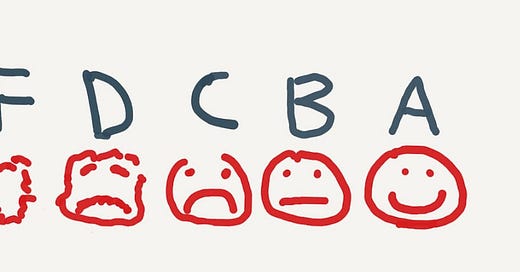Sssh. I'm all caught up with my grading.
Don't tell any one. I just want to think about this a minute.
I am not a trained academic — or maybe the word is academician.
Who cares?
I did not go to college to study how people learn. I went to college to learn to bring down a presidency — as hard-working journalists helped end the career of Pres. Nixon.
I’m mostly kidding, but when journalism became something I did not recognize and could not accommodate, I dove into teaching. Fortunately, the two careers are similar. You take disparate facts and mold them into an article/lecture that will move your readers/listeners to think. Maybe they’ll agree with you (a newspaper column) and maybe they won’t (but those people are wrong and stupid( (JK). Maybe they will push back (a student) and maybe they won’t. The point is to have them leave a class (or a newspaper column) pondering.
Both careers also involve writing — a lot of it, as well as research and perseverance and dedication and a shit-ton of fun.
Even on the bad days in both my careers, I giggle.
This semester, I am teaching two in-person classes (a First Amendment law class and an honors class that looks at how the media covers (and could cover) poverty. I wrote the honors class last year, but I’ve never taught it before and these students demand the best.
And still? I’m having fun. I’m also teaching a media ethics course and a copy desk course online. Plus there’s a practicum connected to our campus newspaper. In a few weeks, I’ll be advising my 25 or so journalism students and helping them choose next semester’s classes, but those two online courses will be over and life will be a lot less full.
In the class, I no longer pretend to be the sage on the stage (early on, I thought I needed to Know Everything when asked in a classroom). Now I treat my lessons as something I’m learning, too. The students can teach you, once you climb off the stage. What the honors class is teaching me is that the slip of my ambivalence toward grading is showing beneath my skirts. I have taken seminars on grading fairly. I think about the grades I give. And yet when I sit down to assess someone’s work, I think, “Yeah, but what do I know?” I mean, I know persuasive/conversational/accessible writing, but when I sit down to tell a student who’s schooled in more formal ways of communication (say, an English major), it’s a long slog — for them and for me.
Writing is like a thumbprint, and writers — even young writers — have voices. We just had a conversation in class about never ever altering a writer’s voice, but make sure things make sense and correctly-spelled words are in their proper places. Part of their grade is based on editing each other’s work, so I am, essentially, grading their grading of their peers. These students — none of whom study journalism — have a lot of questions about how much to edit and when are they crossing a line, and I didn’t tell them this week that I have those same concerns, though I probably should tell them that. This isn’t physics or math, where the answers are fairly clear. This is writing, and critical thinking, and entirely subjective, as one criminal justice major lamented in class.
Yes. And this is life, where the gray areas are where the fun begins. So this is my goal this semester for this group of students. Push away from the dock. Sail waters you don’t know. Try something different in expressing yourself. I do not dock the grades of people who try. And that’s the best grading compromise I can make with myself.
Have a great weekend.





I cannot think of a better way to approach the horror show that's grading.
Tangent: As my son came up through public schooling, I was low-grade horrified at how grading in things like English lit/reading/writing is now very strictly based on rubrics, which they obligingly hand out: so many points for this, so many points for that. I didn't tell Chun Woo till he graduated high school that I would have crashed and burned with that kind of tacky-tacky grading. As it was, I talked him through producing The Five Paragraph Essay as like building a model very meticulously, toward producing longer work and then producing looser work if it better fit what you want to say. And that no one told me that way, and maybe it wouldn't have helped me, but I could assure him that it was better to suck it up and learn what you can learn from it, instead of fighting it indignantly the way I did.
Tangent on tangent: Today we start the drive to Oregon, where he will begin his first year of university.
Several years ago I thought that maybe I could do proofreading as a retirement income stream. I signed up to take online classes from a fairly reputable university and sailed through the first class on correcting grammar, punctuation, and spelling. Then we got to the heavy stuff. I never grasped the idea of rewriting the author's words without changing the author's "voice," at least not to the instructor's satisfaction. I made notes/comments/queries to the author when I shouldn't have, and omitted them when I should have made them. I concluded that, as a non-English major, I made a pretty good software engineer, but proofreading was not in my future. I commend you for taking on the task of teaching it!